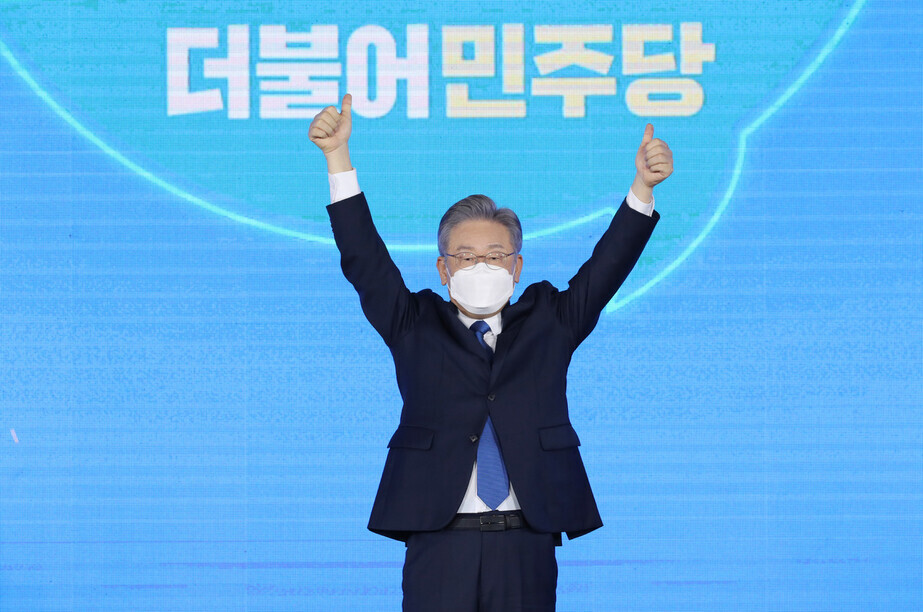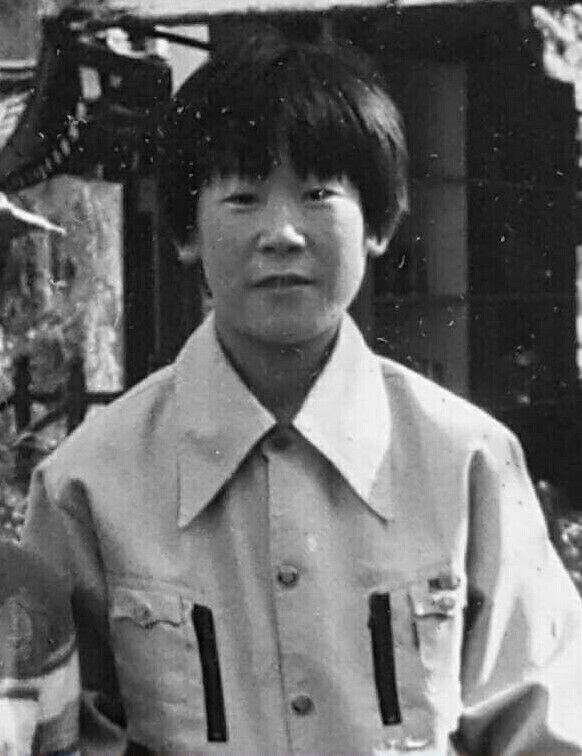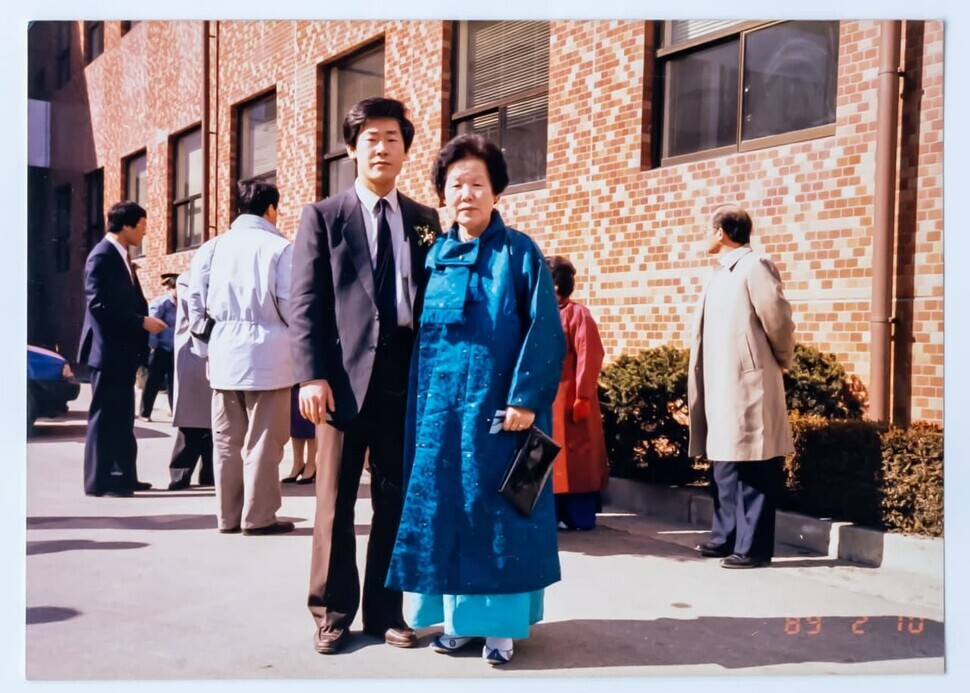hankyoreh
Links to other country sites 다른 나라 사이트 링크
Lee Jae-myung: from factory boy to ruling party’s presidential nominee

The keyword that best describes Gyeonggi Province Gov. Lee Jae-myung, 57, who on Sunday was named the ruling Democratic Party of Korea's nominee for the presidential election in March next year, is "non-mainstream." He worked at a factory instead of going to middle school because of dire poverty, and after passing the bar exam, he chose to be a human rights lawyer rather than a judge or prosecutor.
Thus he is also not part of the political mainstream based in Seoul's district of Yeouido, the heart of domestic politics, as he developed his political muscles as the mayor of a provincial city. In announcing his candidacy on July 1, he said, "We will move toward a world where everyone lives well through strong-willed politics that cares for the lives of the underprivileged." This pledge reflects the path he has led.
The no-name young factory worker with nothing to lose
Lee's childhood was one of poverty. Born in 1964 in Andong, North Gyeongsang Province, to a poor farmer's family, he was one of five sons and two daughters. After finishing elementary school, he moved to the southern Seoul suburb of Seongnam, Gyeonggi Province. Because of financial difficulties, he began working at a factory rather than attending middle school. After his left wrist joint was twisted by a press machine in an industrial accident, he was classified as having a class 6 disability. He still cannot stand with his arms straight at his sides because of his bent arm.
He decided against becoming a factory manager after finishing high school. After putting a thumbtack on his desk to prevent himself from dozing off while studying, he graduated from middle and high school by passing equivalency exams. Lee was admitted to the Chung-Ang University Law School in Seoul in 1982 with a scholarship and a stipend for living expenses.
Driven to lift himself out of poverty, he said while taking a photo with his mother at his admission ceremony, "I'm going to make it big. That way I can make sure my mom lives well" according to the book "Lee Jae-myung, the Man.”
After entering law school, however, he changed course after discovering the truth behind the May 18 Gwangju Uprising. Seeing photos of people being slaughtered and friends who shared the truth about the incident being dragged away, he resolved to change the world. "Gwangju was my salvation, my teacher and the root of my social consciousness," he said in his book "Lee Jae-myung's Bent Arm."
From social activist lawyer to politicianIn 1986, Lee passed the law bar. He was a member of the 18th class of the Judicial Research and Training Institute, created the group Korean Society of Labor Law and issued a statement urging judicial reform. After attending a lecture at the institute by future president Roh Moo-hyun, who was then a human rights lawyer in Busan, Lee decided to defend such rights as a lawyer.
At his law office in Seongnam, Lee had the motto "Defend the people's livelihood" framed on his wall. He formed the group MINBYUN-Lawyers for a Democratic Society and headed up efforts to defend labor and human rights. In 1995, he was a charter member of the Seongnam Citizens Association and expanded his activism to civic issues. He raised suspicions over preferential treatment for "changing the use of the Baekgung and Jeongja areas" in the Bundang ward of Seongnam and exposed a scandal over the preferential allocation of Parkview Apartments in Bundang.
When fears of a vacuum in medical services arose after the simultaneous closure of two general hospitals in the city, Lee started a social movement to set up a municipal hospital in Seongnam. In 2004, however, the Seongnam City Council, which was then controlled by the conservative Grand National Party, rejected the initiative in 47 seconds. This decision persuaded Lee to enter politics, as he concluded that social movements alone could not change the world.
In the local elections of May 31, 2006, he ran for mayor of Seongnam under the then ruling Uri Party and in the 18th general election in 2008, he ran for the National Assembly from the Bundang A region under the now-defunct Democratic United Party. He lost both races. In 2010, he was elected mayor of Seongnam, the fifth to be elected by popular vote, and earned a second term in 2014. His experience with poverty led him to push for welfare programs such as a basic youth dividend, free postpartum care centers and free school uniforms while mayor.
Limits of being a 'non-mainstream politician' despite being driven
Lee competed in the Democratic Party’s 2017 presidential primary following the candlelight protests that brought down the Park Geun-hye administration. Pledging "to break the link between politics and business," he surprisingly came in third with 21.2% of the vote, just 0.3 of a percentage point behind runner-up and then South Chungcheong Province Gov. Ahn Hee-jung.
Rather than run for a third mayoral term, Lee ran for governor of Gyeonggi Province in 2018. He picked up 56.4% of the vote, easily beating incumbent Nam Kyung-pil of the now-defunct conservative Liberty Party Korea with 33.5%.
The mayor's campaign slogan "Lee Jae-myung gets it done" clearly shows his drive. His crackdown on illegal facilities that privatized valleys and rivers in Gyeonggi Province, hands-on command during the COVID-19 pandemic last year, and allocation of funds for basic income and disaster support are considered examples of his "leadership in action."
Yet controversy has dogged Lee, including an alleged affair with an actress, and abusive language used against his sister-in-law, as well as his "cider" comments referring to the feeling of a carbonated drink flushing out the digestive system. On Wednesday, he said, "I'm proud to be the strongest among the country's politicians in terms of policy stability," adding, "But I need to correct my lack of emotional dignity and harsh manner of speaking."
Another weakness is Lee's inexperience in central government politics. He mentioned this in his evaluation of the "longevity of the periphery." In his book "Lee Jae-myung Gets It Done," he wrote, "The political perimeter instead becomes a base camp for a big challenge. Historically, great changes have always come from the periphery."
Rumors of corruption could also hamper Lee's presidential bid given the allegation surrounding Yu Dong-gyu, former executive of Seongnam Development Corporation, and others who worked with Lee while he served as mayor.
By Seo Young-ji, staff reporter
Please direct questions or comments to [english@hani.co.kr]

Editorial・opinion
![[Column] Park Geun-hye déjà vu in Yoon Suk-yeol [Column] Park Geun-hye déjà vu in Yoon Suk-yeol](https://flexible.img.hani.co.kr/flexible/normal/500/300/imgdb/original/2024/0424/651713945113788.jpg) [Column] Park Geun-hye déjà vu in Yoon Suk-yeol
[Column] Park Geun-hye déjà vu in Yoon Suk-yeol![[Editorial] New weight of N. Korea’s nuclear threats makes dialogue all the more urgent [Editorial] New weight of N. Korea’s nuclear threats makes dialogue all the more urgent](https://flexible.img.hani.co.kr/flexible/normal/500/300/imgdb/original/2024/0424/7317139454662664.jpg) [Editorial] New weight of N. Korea’s nuclear threats makes dialogue all the more urgent
[Editorial] New weight of N. Korea’s nuclear threats makes dialogue all the more urgent- [Guest essay] The real reason Korea’s new right wants to dub Rhee a founding father
- [Column] ‘Choson’: Is it time we start referring to N. Korea in its own terms?
- [Editorial] Japan’s rewriting of history with Korea has gone too far
- [Column] The president’s questionable capacity for dialogue
- [Column] Are chaebol firms just pizza pies for families to divvy up as they please?
- [Column] Has Korea, too, crossed the Rubicon on China?
- [Correspondent’s column] In Japan’s alliance with US, echoes of its past alliances with UK
- [Editorial] Does Yoon think the Korean public is wrong?
Most viewed articles
- 1‘We must say no’: Seoul defense chief on Korean, USFK involvement in hypothetical Taiwan crisis
- 2N. Korean delegation’s trip to Iran shows how Pyongyang is leveraging ties with Moscow
- 3Amnesty notes ‘erosion’ of freedom of expression in Korea in annual human rights report
- 4[Column] Park Geun-hye déjà vu in Yoon Suk-yeol
- 5‘Weddingflation’ breaks the bank for Korean couples-to-be
- 6[Reportage] On US campuses, student risk arrest as they call for divestment from Israel
- 7[Guest essay] The real reason Korea’s new right wants to dub Rhee a founding father
- 8[Editorial] New weight of N. Korea’s nuclear threats makes dialogue all the more urgent
- 9Will NewJeans end up collateral damage in internal feud at K-pop juggernaut Hybe?
- 10Why Korea shouldn’t welcome Japan’s newly beefed up defense cooperation with US